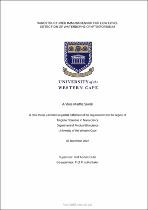| dc.contributor.advisor | Dube, Admire | |
| dc.contributor.author | Siwak, Andrea Martha | |
| dc.date.accessioned | 2023-02-27T09:12:14Z | |
| dc.date.available | 2023-02-27T09:12:14Z | |
| dc.date.issued | 2022 | |
| dc.identifier.uri | http://hdl.handle.net/11394/9656 | |
| dc.description | >Magister Scientiae - MSc | en_US |
| dc.description.abstract | A major causative agent of gastrointestinal disease is Cryptosporidium, a protozoan
waterborne parasite identified in over 70 countries. Cryptosporidium infection is a
cause of high disease morbidity in children and the immunocompromised, with
limited treatment options available for patients at risk of severe illness. The hardy
nature of the organism leads to the persistence of its oocyst form in drinking water
sources, with standard water treatment procedures such as chlorine disinfection and
activated sludge proving inefficient for its removal from effluent water. | en_US |
| dc.language.iso | en | en_US |
| dc.publisher | University of the Western Cape | en_US |
| dc.subject | Nanoscience | en_US |
| dc.subject | Nanotechnology | en_US |
| dc.subject | Electrochemistry | en_US |
| dc.subject | Bioscience | en_US |
| dc.subject | Gold nanoparticles | en_US |
| dc.title | Nanostructured immunosensor for low level detection of waterborne cryptosporidium | en_US |
| dc.rights.holder | University of the Western Cape | en_US |

